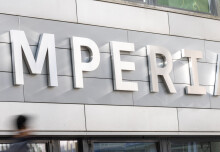

An interview with Imperial's Professor Simon Donaldson<em> - News</em>
See also:
By Danielle Reeves
Tuesday 1 December 2009
Simon Donaldson, Professor of Mathematics at Imperial College London, added to his collection of prestigious international awards this year with the announcement of the 2009 Shaw Prize for Mathematical Sciences.
Professor Donaldson, who won the Fields Medal - often referred to as the 'Nobel Prize of mathematics'- in 1986, shares the Shaw Prize with Professor Clifford H Taubes from Harvard.
I went to meet Professor Donaldson to find out more about his work, his inspiration and life as a pure mathematics researcher.
Professor Simon Donaldson - joint winner of the 2009 Shaw Prize in mathematical sciences
What inspired you to pursue a career in mathematics?
As a child I was passionate about sailing, which led – at about the age of 12 – to an interest in the design of yachts and dinghies. This was one of the main reasons I developed an interest in mathematics, as I was fascinated by the different equations used in boat design, from calculating the stability of the vessel to working out the volume below a particular waterline.
As a teenager I became more absorbed in mathematics for its own sake – I remember trying to find an approximate distribution law for prime numbers, for example. Of course, I made no real progress but it did mean that even whilst at school I was thinking to some extent like a research mathematician.
I attended Sevenoaks school in Kent, where I strove to be the best, or one of the best, in maths and physics. I was lucky to have some very inspiring teachers in these subjects.
What's your research all about?
I work on geometry, topology, which is the study of shapes, and algebraic geometry. My work is theoretical and focuses on understanding the geometry of three dimensional space, and four dimensional space-time. I use differential equations, which are the basis of all physical science, to look at topology and geometry in new ways.
Together with many other mathematicians around the world, notably Cliff Taubes at Harvard, who I have known for many years, I have developed new techniques and ideas in geometry, originating in theoretical physics and quantum theory.
What's life like as a pure mathematics researcher?
My real work is done alone with paper and a pen. In this way my life is more like that of a writer than of a typical scientist, I suppose. It's fascinating to think that this process and working technique has hardly changed since Newton's time.
It can be a somewhat lonely activity though, so I make sure that I spend plenty of time talking to and sharing ideas with colleagues and research students at the College, which is a very important and productive part of my work too.
What motivates you?
Sophisticated, modern mathematics is behind all branches of modern science, and we all use it every day without realising it – for example, the technology for encoding digital photographs is based on complex mathematics. It's great to work in a branch of science that has such a range of applications.
My own personal research is very fundamental in its nature, and not so easy to relate to everyday concepts, but I am motivated by working in 'the universe of ideas', discovering fundamental mathematical facts and irrefutable truths about the way things are.
What are you most proud of in your career?
One of the things that gives me most satisfaction is the part I've played in developing Imperial's geometry research profile since I joined the College in 1998. There was no recent tradition of geometry at Imperial in the late 1990s, but we are now one of the leading centres in the world, alongside Harvard, Princeton, Oxford and Columbia. This is very largely thanks to the drive and enthusiasm of my colleague Richard Thomas, who came to the Department just after I did, and many other colleagues who have joined us since.
Article text (excluding photos or graphics) available under an Attribution-NonCommercial-ShareAlike Creative Commons license.
Photos and graphics subject to third party copyright used with permission or © Imperial College London.





